3 Years Empress Theophano Prize
Some of the words heard in the rotunda
© Studio 8 Photos, Efi Panagoula
FOREWORD BROCHURE
Two thousand years of history, cultural, religious and social roots, continue to play an important role for people all over Europe, and worldwide. Technology, economy or politics cannot erase them.
Since its launch in 1952, the EU and its precursor organisations have been based on a rather one sided interpretation of European history, focussed on the Charlemagne Empire, the successor to the West-Roman Empire. Central and Eastern Europe were behind the Iron Curtain and could be conveniently forgotten. After the EU enlargement, the narrative did not fundamentally change, not least because the different histories of countries east of Vienna or Prague are less well known in Western Europe. Moreover, there was a hidden belief that its political, economic and societal models were superior.
Strasbourg University, the idea of the prize was developed by Stefan Schepers, a Belgian, and Theodor Ikonomou, a Greek.
It received immediate support of Herman Count Van Rompuy, the President Emeritus of the European Council, who understood the importance for cooperation in the EU of understanding and bridging of Europe’s cultural diversities.
It was turned into reality in just one evening by Stavros Andreadis and his friends in the Cultural Society of Entrepreneurs of Northern Greece, Nikolaos Efthymiadis and Constantinos Geloudis, later joined by others.
The Empress Theophano Prize honours a nearly forgotten woman who played an important role in early European history, and who has herself a good example of inter-cultural exchange and adaptation to a ‘Leitkultur’, by marrying the heir of the German Empire, Otto II. She was a niece of the Byzantine Emperor Johannes I Tzimiskes. Throughout the whole Carolingian and Ottonian period, the Byzantine Empire was regarded in Western Europe as the ultimate symbol of economic development and cultural sophistication. For a woman of the Eastern Imperial House to marry the heir apparent of the ruler of the Holy Roman Empire conferred immense prestige on the West. She was to have a significant and lasting influence.
Theophano would have a great influence on the early beginnings of gender equality in Western Europe, on education, on trade with the Empire and beyond, and on its sanitary and culinary habits. She thus contributed to the foundation of the flourishing culture in the Middle Ages.

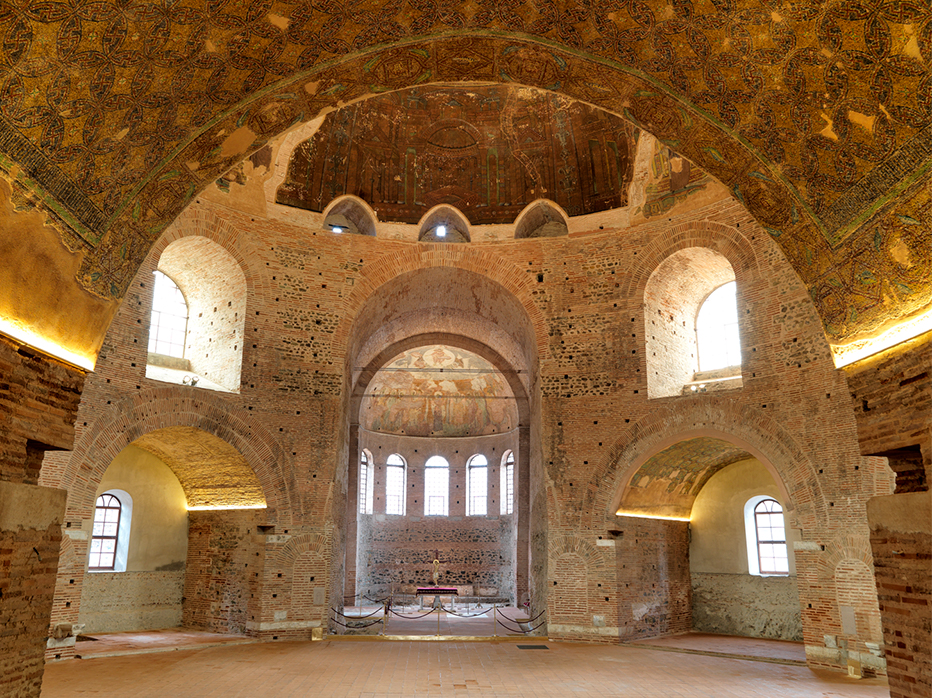
INAUGURAL EVENT – Empress Theophano Prize
‘The city of Thessaloniki takes centre stage in highlighting the modern European Union ideal’
On 16 February 2019, the Theophano Foundation launched its activities, from the city of Thessaloniki, with the initiative of an annual award, the Empress Theophano prize, to recognize personalities that promote a modern European identity and highlight common European principles and values.
The Prize will be awarded every year by Theophano Foundation, as a distinction, following a process of assessment of the candidates by the Advisory and Governing Councils of the Foundation. The Award Ceremony will be taking place in Thessaloniki, at the Rotunda Monument, a site symbolizing and bearing witness to the Roman, Byzantine, Christian Orthodox, Ottoman and Greek influence in the shaping of Europe.
2020 – Extracts of the Welcome Speech by Stavros Andreadis, President of Governing Council
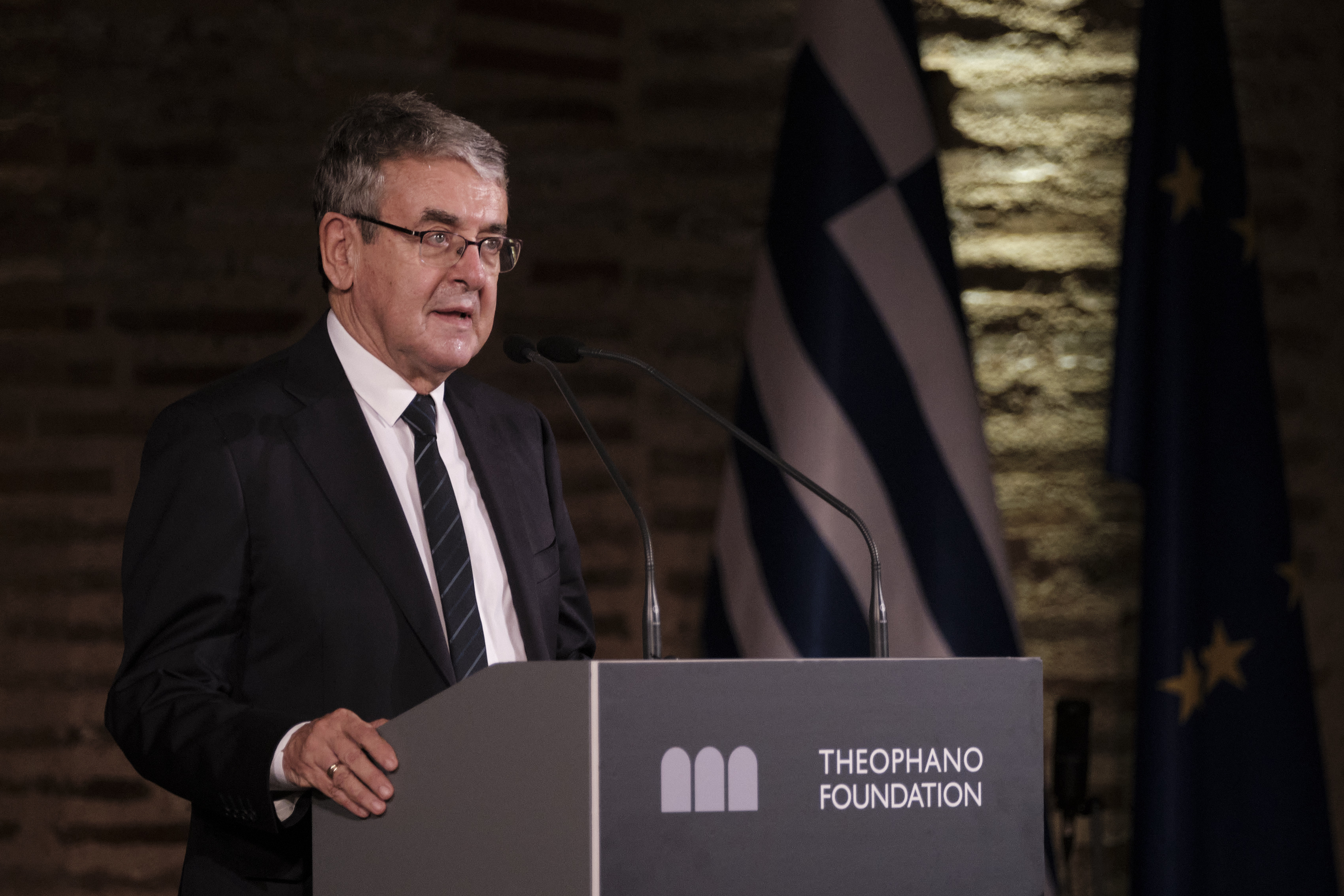
Mrs President, Mr Prime Minister, ladies and gentlemen,
On behalf of the Governing Council of the Theophano Foundation, I welcome you to today’s event and to the ceremony to award the inaugural Empress Theophano Prize to the European Union’s Erasmus Programme.
We are inside a unique historical landmark in a city with centuries of history, in order to highlight, via the Empress Theaphano Prize, that our common cultural roots – the roots which shaped contemporary Europe – are interlinked and have continuity.
The city of Cassander, which carries the name of his wife who was also Alexander the Great’s sister, Thessaloniki has been a great commercial and intellectual centre for south-eastern Europe for over 2300 years. Our city stands out for its uninterrupted urban continuity, from the Hellenistic period through to the contemporary era. Through the centuries, here lived and ruled every person who shaped the Europe of today (…)
The choice of naming the award after Theophano, a Byzantine princess of the 10th century who went on to become Empress of the West Roman Empire, building bridges in culture and contact, as well as Thessaloniki, the principal Byzantine city, as the seat of the award, both certainly send out a very strong message. We are truly elated (…)
I would like to thank a leading European who is also a friend, Herman van Rompuy, who kickstarted the idea for this award. Herman is a true European statesman in the tradition of the great political leaders who put in place the foundations for the Europe of today.
2020 – Extracts of the Prize Speech by Herman Count van Rompuy, President of Advisory Council

When I stand here I think of Empress Theophano who could never have imagined that people would commemorate her a thousand years later. In politics today, people forget more quickly! A Byzantine princess, later reigning empress of the Holy Roman Empire, symbolically returns to her native soil. We are also standing here in the Rotunda, which in her life of almost two thousand years has known many masters. Today it is the link between East and West, between countries, cultures and religions. The Rotunda connects tonight and does not divide.
But we are not standing by the Old Era. The Theophano Prize is awarded to the Erasmus programme enjoyed by millions of young Europeans. They live in peace and, compared to many others in the world, in prosperity. These walls of history welcome those young people.
Let me express it as a haiku poet:
Young people sing
The Ode to Joy
The empress cheers
The laureate is not an individual man or woman. It’s about men and women who entered their Erasmus years as inhabitants of Europe and left as European citizens. Studying or teaching abroad is not a purely intellectual experience but an existential one. It shapes someone, or rather it transforms someone. It is perhaps the European Commission’s most successful programme. That is why it is so important that the President of that Commission Mrs von der Leyen is here with us today, albeit in a virtual way, but at the very moment when we are gathered here. In passing, I would add a bold comparison: Theophano is the first empress of Germany and Mrs. von der Leyen is the first female President of the Commission (…)
The Theophano Prize has a great future ahead of it. The Rotunda will have many memorable evenings ahead of it. But there can only be one celebration the first. And that is today.
2020 – Extracts of the Address by the Greek Prime Minister, Kyriakos Mitsotakis

It is a pleasure to meet with you today, even under these unprecedented conditions needed to protect everyone from the coronavirus. It is fortunate, however, that technology can do away with both distance and with time.
The Empress Theophano distinction was born to honour individuals, institutions and organisations that promote and further the European idea.
That is, those who contribute to the comprehension of Europe’s different starting points, all of which nevertheless flow into the same river bed: the equal union of its states.
It is a prize that is quite literally European. Because the idea comes from former President of the Council Herman Van Rompuy.
Dear friends,
Ten centuries on, after the Byzantine princess’s first journey, we do not base European countries’ ties on marriages of their monarchs.
On the contrary, they are built on the interaction of its citizens, which is the essence of its democratic achievement: not just connecting states. But having their societies share a common fate.
The inaugural prize thus deservedly belongs to an institution which, for over three decades, has been promoting the osmosis and mutual understanding of Europeans.
How? By moulding the youth and by giving shape to the status of European citizen.
As dear Ursula recently said at the European Parliament, “let’s stop talking… And let’s get to work … And let’s build the world we want to live in”.
Today, we celebrate Europe and its values. And I am overjoyed that the Empress Theophano Prize for the ERASMUS institution will be received by the President of the Commission herself.
She is, I believe, the most suitable person to bring to Brussels the honour awarded by Thessaloniki to the idea and to the future of our shared homeland.
A prize that carries the name of a powerful woman from the 10th century, in the hands of a dynamic woman and a leading figure of the 21st century.
2020 – Extracts of the Prize Winner’s Speech by the President of the European Commission, Ursula von der Leyen
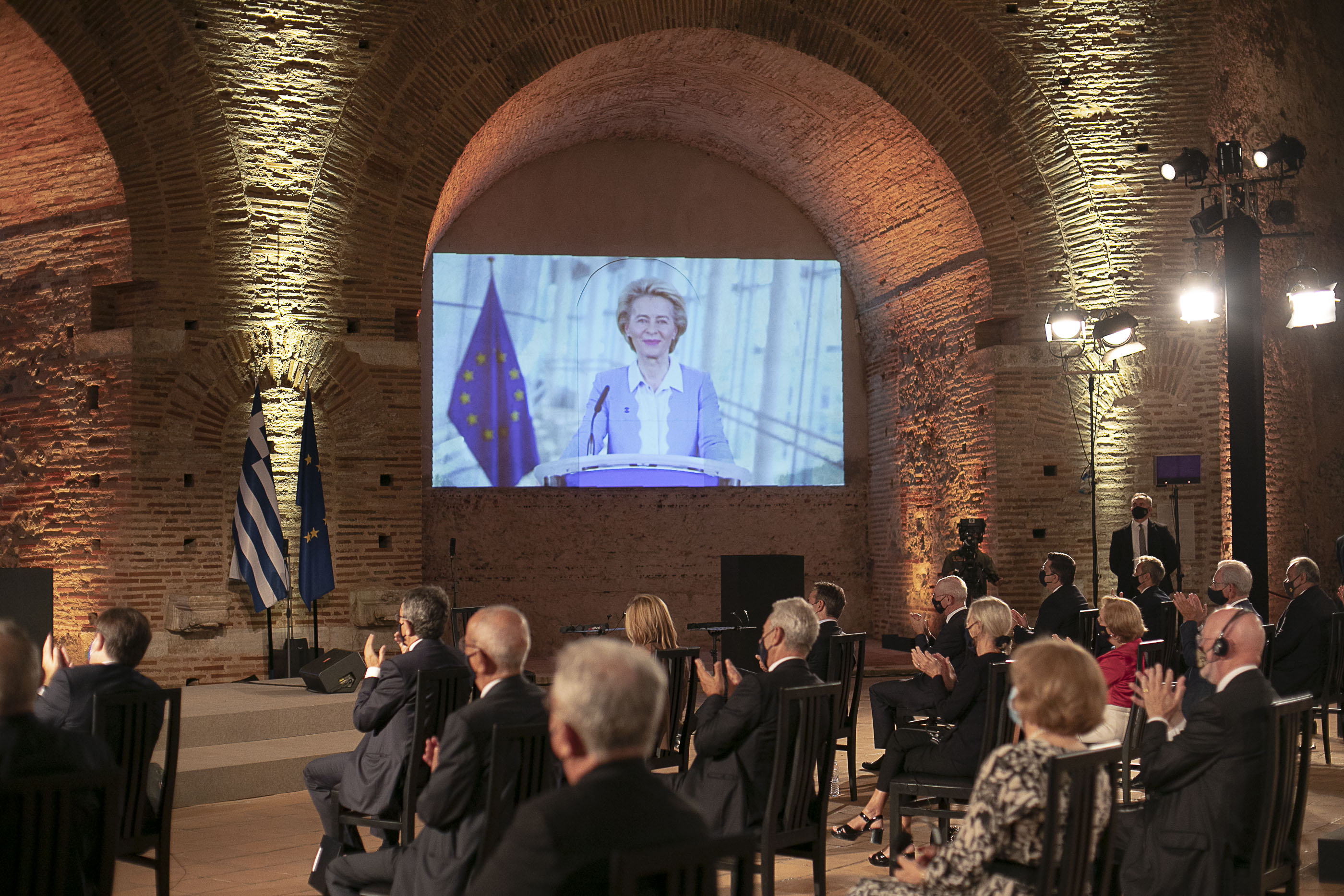
It is an honour to receive this prize as President of the European Commission and for the ten million Europeans who have taken part in the Erasmus programme since its inception. It is a prize to the students, the teachers, the dreamers who have made this European miracle come true. It is a prize to the ‘mother of Erasmus’, Sofia Corradi, who first had the idea of a European student exchange back in the 1960s.
The Empress Theophano Prize that you are awarding tonight (…) is about the values that make us European. It is about the beliefs and the actions that have brought our continent together, after thousands of years of conflict. It is about a shared culture that does not stop at borders (…)
The Erasmus programme worked as a perfect bridge between the young generations all across Europe. Millions of youngsters discovered what they had in common with other nationalities, and what made them unique. For the first time, they felt that they belonged to one big community that spread beyond their country’s national borders. Today, the Erasmus generation is all around us (…)
My children studied – thanks to Erasmus – in Barcelona, Zürich, Paris and Poznań. To the generation of my sons and daughters, Erasmus is as important as the Single Market, the single currency and open borders (…)
It is right that the European budget agreed by the European Council includes a 55% increase for Erasmus. This is money well spent! But it is equally important progress that we are also extending the scope of Erasmus. In the future, more pupils and young people in education should benefit from the programme. Whether they go to school, whether they attend university or take part in a vocational training. Erasmus should be a truly democratic institution for all young Europeans!
After 30 years, we can proudly say that Erasmus is one of the greatest unifying achievements in the history of our Union.
Long live Europe.
2021 – Extracts of the Welcome Speech by Stavros Andreadis, President of Governing Council
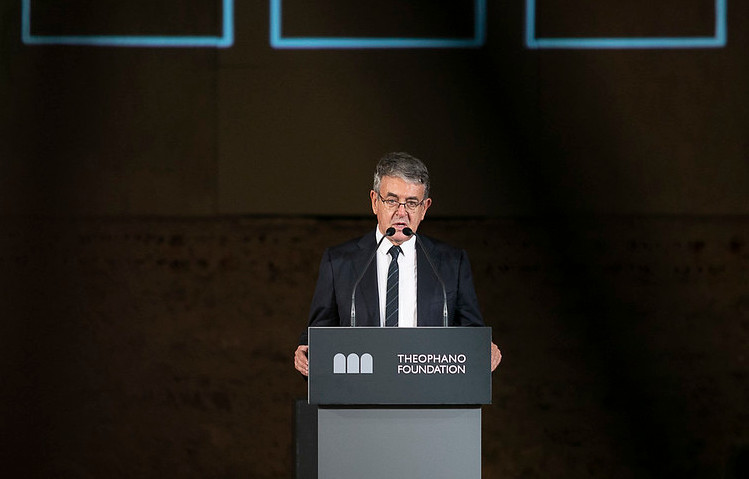
I feel great joy as well as a sense of pride to be welcoming you all here, today, to the Award Ceremony for the second Empress Theophano Prize. The presence of such great personalities from every corner of Europe is a special honour for our effort, for the city of Thessaloniki and for my home country, Greece.
The Empress Theophano Prize aspires to promote, particularly in the eyes of the youth and in a way that is contemporary and fresh, our common European idea; the idea which brings close the East and the West, the North and the South of our continent, Europe. In these uncertain times where so much is changing, we are inspired by the path of Empress Theophano, who brought the Byzantine civilisation to the imperial court of Germany of the time, who built bridges of exchange and understanding and who was a pioneering European in her own right.
The Foundation’s Governing Committee, which I have the honour of presiding over, accepting the recommendation of our Advisory Committee, decided to award the prize to two unique people and leading scientists – Uğur Şahin and Özlem Türeci – the couple who, with self-sacrifice, placed themselves in the front line of the great battle that humanity gave and is still giving against an insidious and dangerous foe, which, in very little time, has upended the balance all over the planet, causing great human loss and great suffering, especially so in its poorest parts (…)
Let us look around. We are all here today in this unique ancient monument – a monument that is Roman, Byzantine, Ottoman and Christian, and conceals within it the deepest roots of our common European identity – to honour two brilliant scientists who have provided an answer to a huge problem of today, allowing us to look at tomorrow with optimism. It is, I think, a momentous occasion.
2021 – Extracts of the Prize Speech by Herman Count van Rompuy, President of Advisory Council
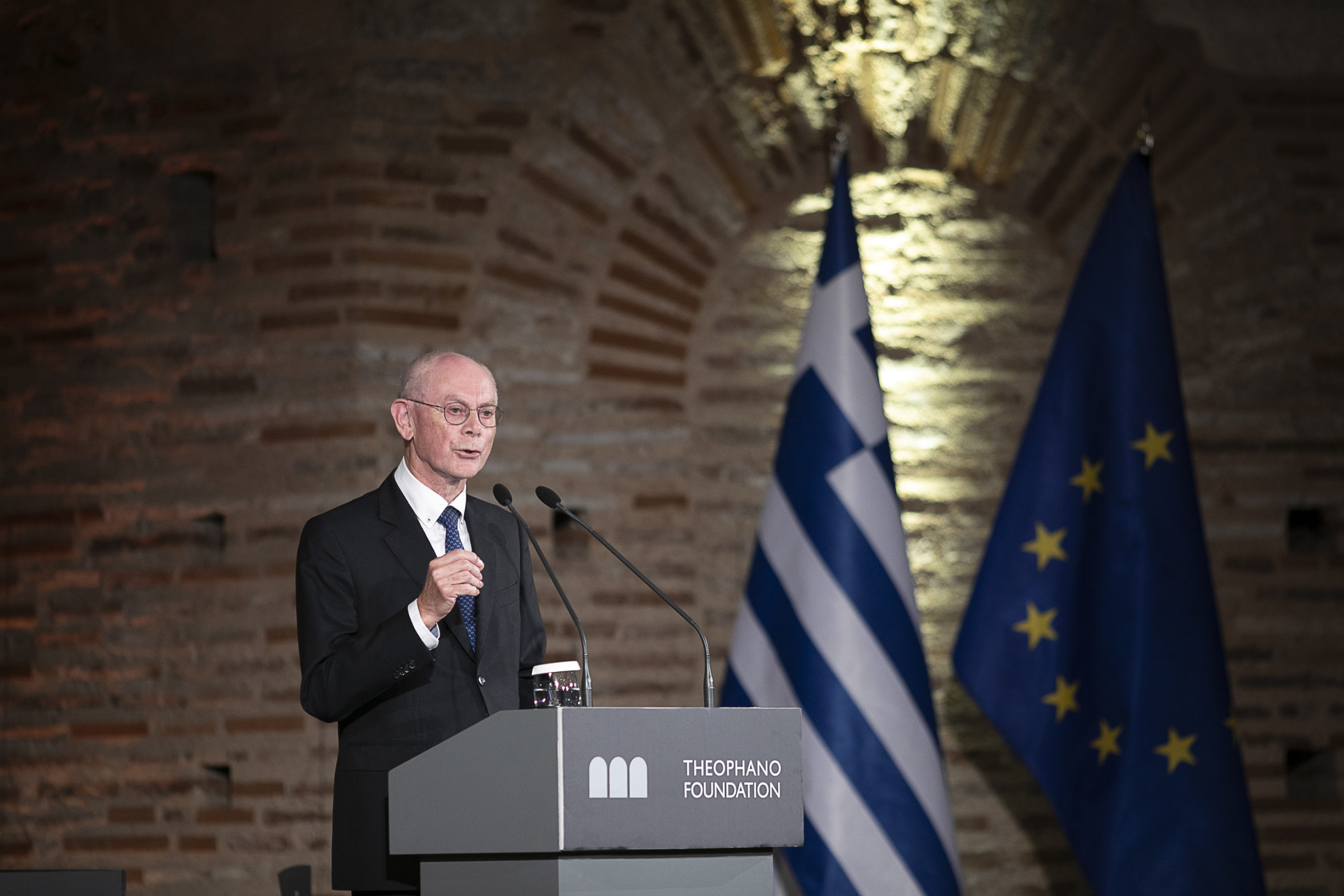
It is the second time that we are united here today in this Rotunda, brought together by the spirit of Theophano, a Byzantine princess and empress of the later Germany who embodied reconciliation between the East and West of our continent, a thousand years ago. The Rotunda itself is two thousand years old and gave a temporary home to the various cultures and religions that make up Europe. We are also near where Alexander and Aristotle lived, who left an indelible mark on our history and civilisation. This city is at the crossroads of so many ways! What a privilege to be here! The presence of the President of the Hellenic Republic adds lustre to this ceremony.
It is also a great privilege to be here to present the winners of the Theophano Prize 2021. The jury I had the honour of chairing, which is made up of former heads of state, former ministers, top diplomats, top magistrates, academics and eminent cultural leaders, unanimously recommended to the Governing Council of the Theophano Foundation that this year’s prize be awarded to the vaccine pioneers who helped to turn around the COVID tragedy, Dr Uğur Şahin and Dr Özlem Türeci. Both have done what many of us societally aspire to do: they have turned fear into hope. Fear is the distinctive feature of our times and the pandemic has intensified this negative feeling par excellence. Tens of millions of people owe their health and their lives to our laureates and their team, to all the scientists who have used their knowledge and talent to turn the tide, to prevent us from reliving the tragedy of a hundred years ago. Yes, progress is possible.
The Theophano Prize wants to be different from other European prizes. Europe is more than a political ideal, important though that is. Politics is in everything but not everything is politics. The Union belongs to the young. That is why we lauded the Erasmus programme last year. After education, today it was science, the fruit of education, that had to be considered. In the future, we should think about how to honour the arts as well, especially when we stand here in the Rotunda and realise what a heritage we have, that is followed by great talent in our countries today (…)
I am extremely pleased and proud that the international jury and the Theophano Foundation itself have given us the opportunity to honour two eminent scientists who have rendered such a service to that half billion people on our continent and so many more far beyond.
2021 – Extracts of the Address by H.E. the President of the Hellenic Republic Ms Katerina Sakellaropoulou
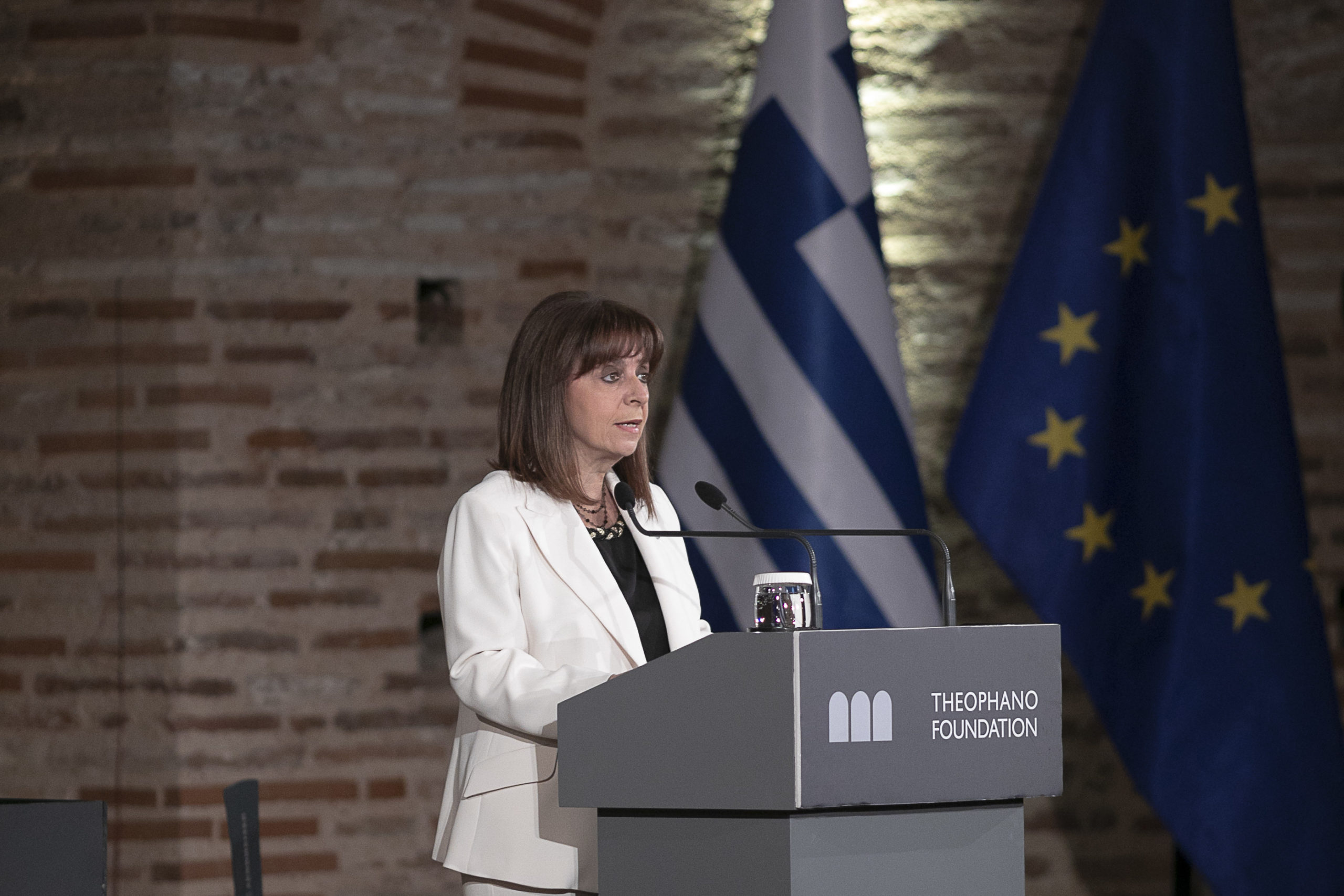
It is for me a special pleasure to be awarding the Empress Theophano Prize to Uğur Şahin and Özlem Türeci. Two exceptional scientists who are a couple in life as well as in research, to whom we owe one of the most reliable vaccines; the product of a partnership between BioNTech, of which Uğur Şahin is CEO, and Pfizer. Two great individuals who, after their triumphant success, were quick to state that the fruit of their research was a victory for innovation, science and global collaborative effort. They thus underlined the importance of teamwork, synergy and convergence towards a common goal – the necessary conditions for the development of science, the most “open” human activity, since it is guided by the principles of universality, impartiality, communality, structured scepticism, and focuses on human wellbeing (…)
It is precisely these qualities that we honour today by awarding them the Empress Theophano Prize. An institution inspired by the contribution of Empress Theophano of the Holy Roman Empire to the spread, both material and spiritual, of Byzantine culture to Saxony in the 10th century AD, the prize has become, in just two years since its establishment, pan-European in prestige and scope. It aspires to promote awareness of the common origins of the Eastern and Western Roman Empires, of the historical interdependences of the peoples and nations of Europe and their importance for today’s European cooperation, and to broaden and consolidate Europe’s relations with its neighbouring cultures. To build bridges, to resist contradictions, to contribute to the mutual understanding of the different peoples and cultural characteristics that make up the rich mosaic of Europe and its neighbours. And, at the same time, by recognising the symbolism of Theophano’s ascension to the throne of the Holy Roman Empire following the death of her husband, Otto II, with her dynamic, free-thinking, educated, astute and diplomatic personality, the prize underlines the importance of the equal participation of women in social and political life.
2021 – Extracts of the Prize Winner’s Speech by Dr Uğur Şahin

Let me first pay tribute to the success of the community of scientists. The rapid development of multiple COVID-19 vaccines is a historically unprecedented success and offers a way out of the pandemic. Several vaccines including vaccines based on traditional technologies as well as on a new technology were developed on record time, and proven to safe and efficacious in phase 3 clinical trials.
However, messenger RNA (mRNA)-based COVID-19 vaccines contributed to this success in an outstanding manner. It marks a new era in drug development. Never before in the history of medicine has a drug based on a new technology been developed so quickly, so successfully, and made available to hundreds of millions of people worldwide.
This breakthrough was not made possible by a single step.
This innovation is based on the accomplishments of many (…)
At some point in the future, mRNA drugs will be used for treatment of a variety of diseases including cancer, allergies, autoimmune diseases, inflammatory diseases, and regenerative medicine to repair and rejuvenate human tissues and organs. One example of a potentially breakthrough medical application enabled by mRNA technology is individualized mRNA immunotherapies tailored to each patient and their tumor’s genetic characteristics.
We believe that this is a key to address one of the fundamental challenges of human cancers, namely that each and every cancer is completely different (…)
(…) Let’s not forget: great progress is based on many small ones. Let us pay attention on the details and diversity of science. Every contribution, no matter how small and from which direction, can make a difference for science and ultimately for humanity.
2021 – Extracts of the Prize Winner’s Speech by Dr Özlem Türeci
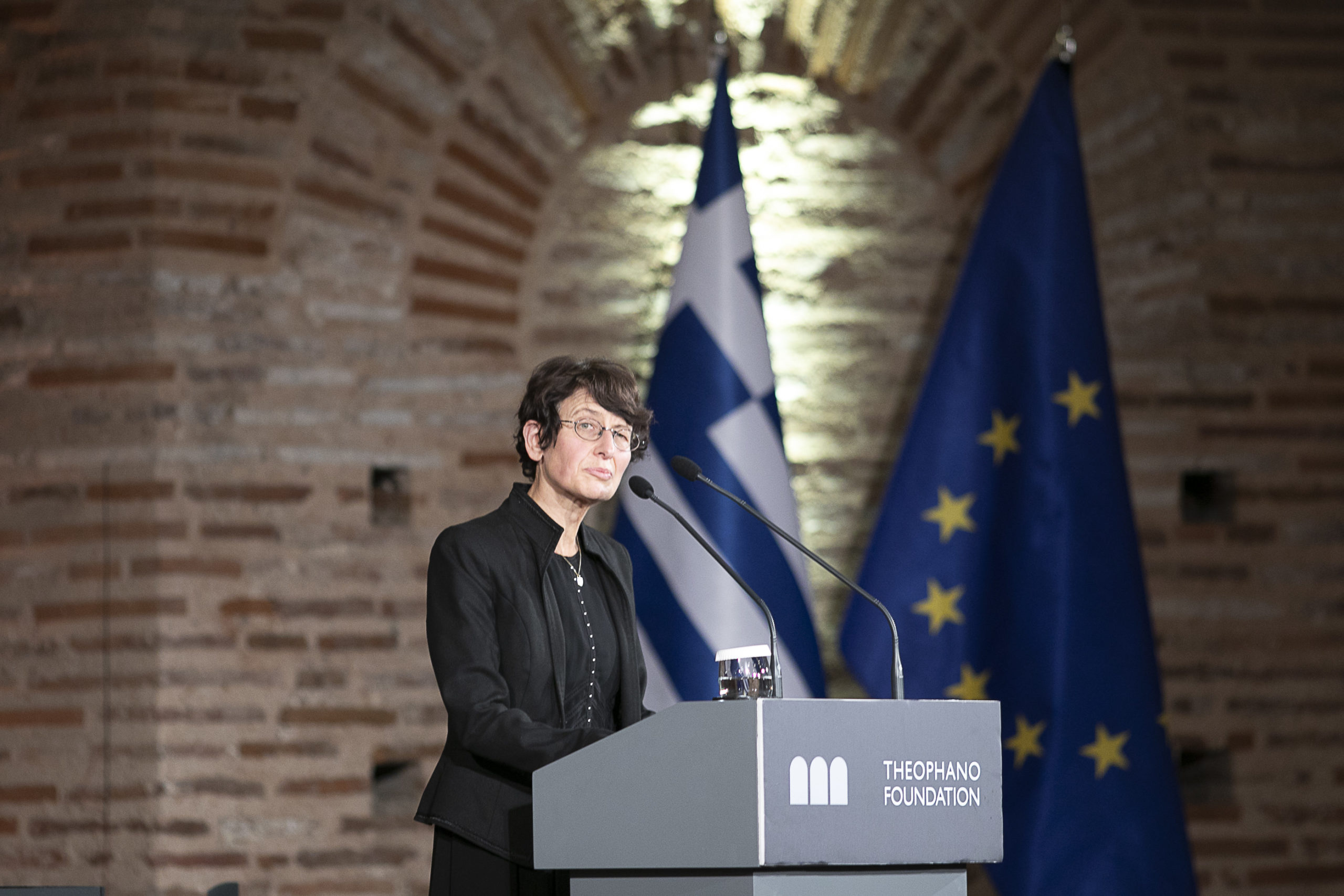
(…) As with any breakthrough innovation, it is the confluence of many efforts that has allowed the practical use of mRNA technology as a powerful tool in the service of humanity – at a time of most dire need.
We thank our incredible team at BioNTech for overcoming the multi-facetted scientific and non-scientific challenges in this race against the pandemic, a race that we named Project Lightspeed to reflect the urgency with which we have all worked.
We thank our esteemed friend Albert Bourla and his extraordinary team at Pfizer for being our partners. From the inception of our partnership, you have wholeheartedly committed to our shared mantra: No one will be safe until everyone is safe, across nations, ethnicities, and economies. We also thank all our collaborators, who contribute to what has now become a broad network with 20 sites for supplying vaccines to the world – a network we are extending into LIMC.
This day, this award, is about recognizing that the most noble purpose of science is to serve humanity – first and foremost
This day is about honoring science and technology making a difference by driving innovation.
We feel blessed and honored to have been able to contribute – thanks to our maintained identity as wanderers between worlds (…)
And that’s the first ingredient: it takes a new breed of scientist, deeply rooted in academia and basic research, who understand how to navigate the cutting edge of drug development within a pharmaceutical and industrial framework while never, ever losing sight of the point of care, the patient, the human being.
The second ingredient is courage, which is essential for sustainable, solution-oriented scientific progress. Courage – because it makes you love the unknown (…)
Moving to the third ingredient that is about partnerships, and collaboration across borders.
To conclude:
Science can – indeed – make a difference at global scale.
But let’s not wait for the next global problem, the next big crisis, to create a sense of urgency.
2022 – Extracts of the Welcome Speech by Stavros Andreadis, President of Governing Council
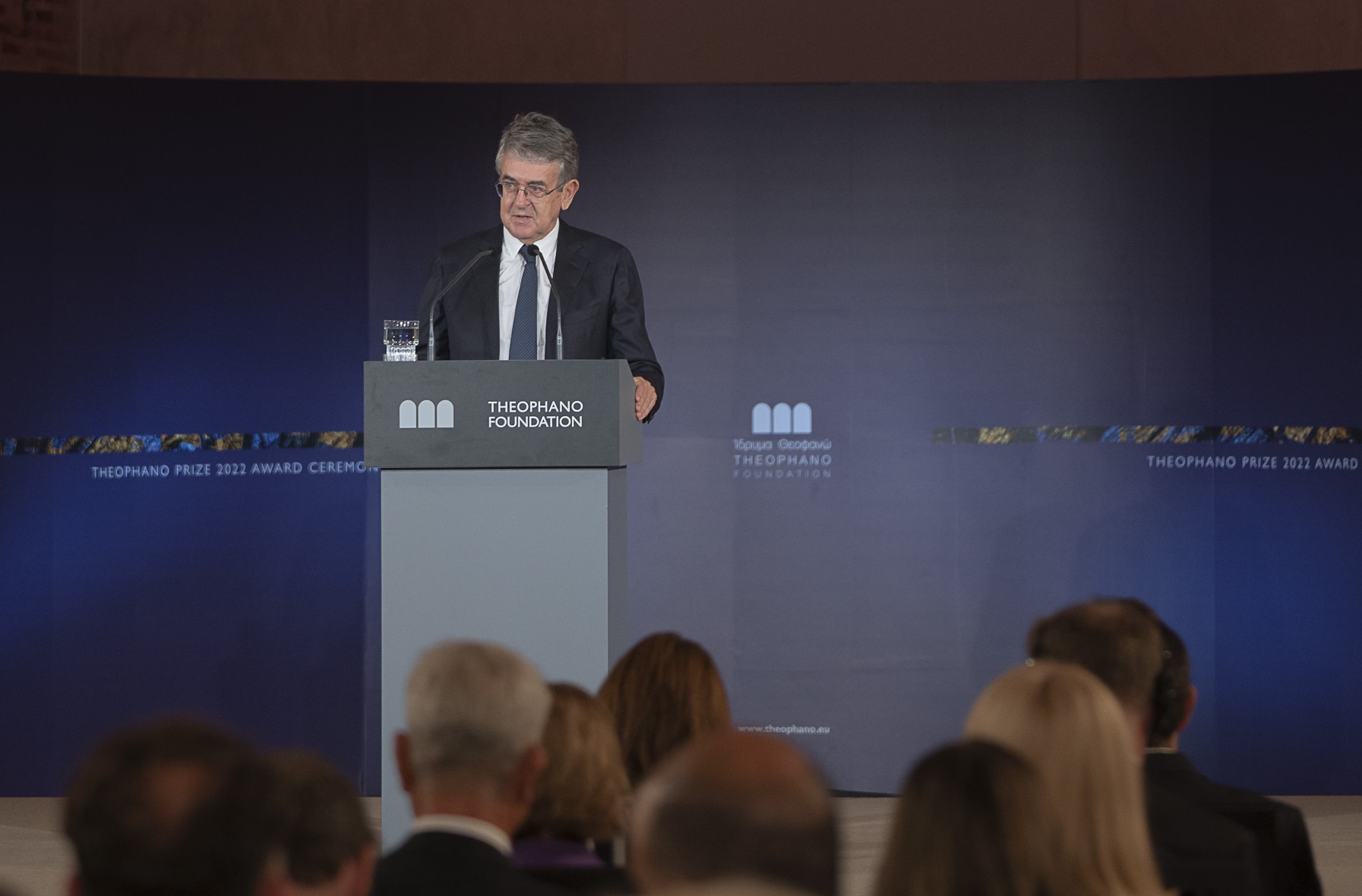
(…) After Education and the ERASMUS university student exchange programme, and Science for the Common Good and the pair of leading scientists that developed the first coronavirus vaccine, this year the Empress Theophano Prize is focusing on Art (…)
Through renowned Pianist and Maestro Daniel Barenboim, a truly magnificent human, and his creation, the West Eastern Divan Orchestra, we want to highlight the power of Art to function as a mediator and a platform of dialogue for differences that so often cause violence and bloodshed.
With Israeli, Palestinian, and Arab musicians, with concerts at venues ranging from Carnegie Hall and the Salzburg Festival, to Ramallah, the border between North and South Korea, and the UN, the West Eastern Divan Orchestra is a unique alternative Art management model, a sample of global culture, where music builds bridges and takes down obstacles that are considered insurmountable.
Daniel Barenboim, a Jew born in Argentina, a European citizen of the world, and, at the same time, a global legend of classical music, once said: “It is important to find ways for there to be contact between people who disagree, with the hope that in the future there will be some sort of cooperation. What we are doing is not even dialogue. It is the process of one learning to understand and respect the narrative of the other. It sounds small, but it is incredibly important” (…)
Daniel Barenboim briefly said: “It is necessary for people to contribute to society in a very individual way. It makes the group much larger than the sum of its parts. Individuality and collectivity must not exclude one another. In reality, together they can enhance human existence”.
I believe that these words of his contain both the meaning of this year’s award, as well as the meaning of the Empress Theophano Prize itself.
2022 – Extracts of the Prize Speech by Herman Count van Rompuy, President of Advisory Council
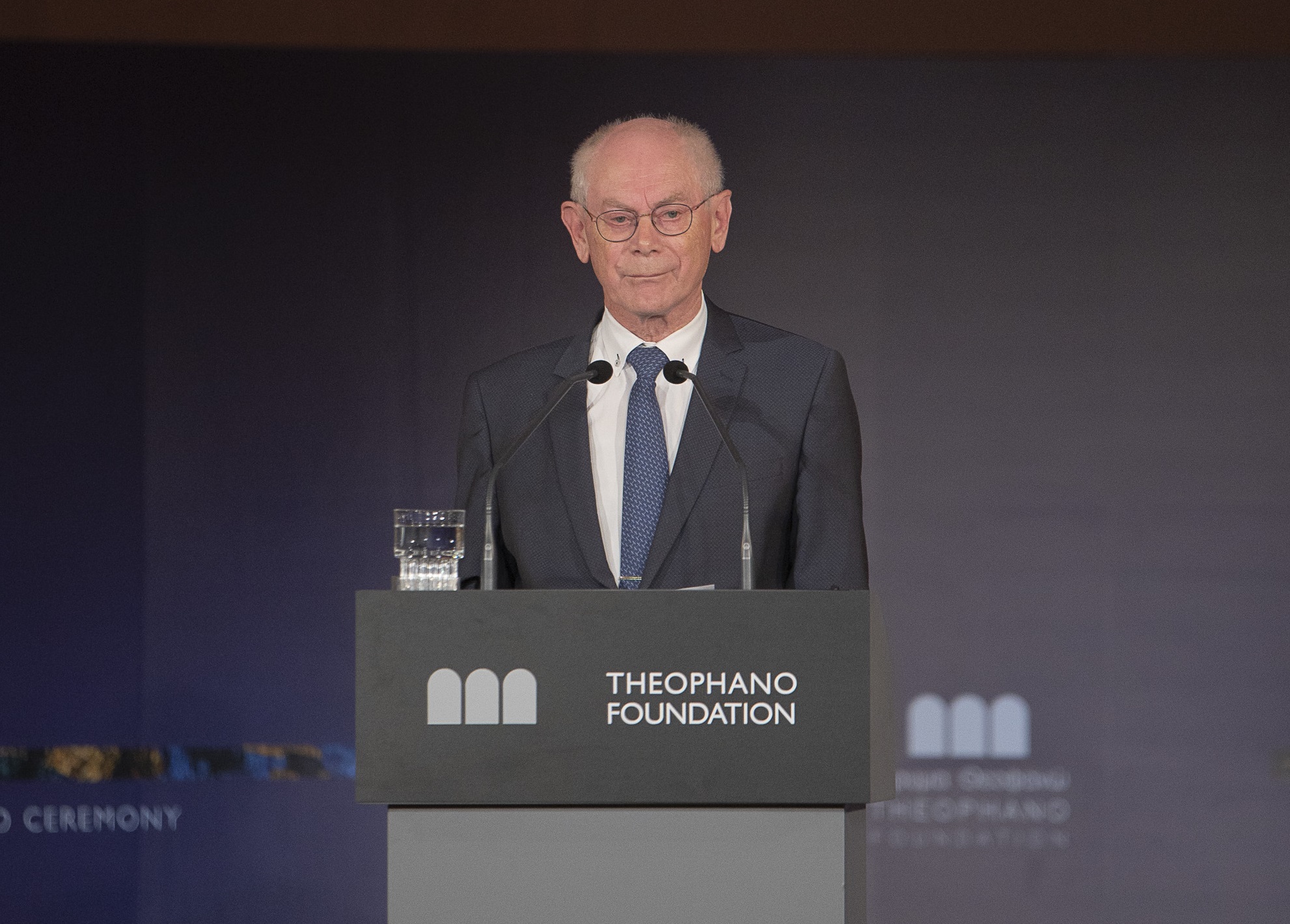
This is already the third time I have stood in this Rotunda to attend the presentation of the Theophano Prize. Each time, the Advisory Council that I have the honour to chair has proposed an initiative or people who have shaped the objectives of the Prize. We want to focus on the idea of cooperation and reconciliation in the laureates’ actions and lives. Constructive dialogues between the West and the East of our continent, between the countries bordering the Mediterranean (…)
The arts and culture in a broad sense bring out the essentials of human beings. It is about Love and Death, about the transient and the eternal, about the I, the You and the We. In short, about life itself and what makes life great and worth living. Music does this most of all among the arts, it is easiest for all to appreciate. By the way, also the visual arts bridge times and cultures, as you can see tomorrow in the exhibition of the Belgian artist Jan Vanriet in the Byzantine Museum. Music is about beauty but also about goodness and truth. It appeals to the heart, the imagination and reason. Music carries us away, draws us into the land of sounds that anyone of any country or language can understand. Music also carries a message. An ode to joy, to love, to brotherhood, to overcoming pain and sorrow, to nature, to the homeland, to the simplicity of everyday life (…)
Daniel Barenboim is not the man of one language. He speaks many but above all he uses the universal language of music.
2022 – Extracts of the Address by H.E. the President of the Hellenic Republic Ms Katerina Sakellaropoulou

It is with great joy that I present today the “Empress Theophano” Prize, which this year focuses on art, to a personality of the stature and outreach of Daniel Barenboim. A leading conductor, whom we have had the pleasure of enjoying in Greece, with perhaps more recordings than anyone else; a superb pianist; music director of many orchestras and festivals, the main one being the Staatskapelle in Berlin, inspirer of “the mixture of awe and energetic courage” with which its members approach music and shaper of its captivating sound; and, at the same time, a great humanist, a brave intellectual, a deeply democratic citizen. An exuberant, outstanding figure, not only endowed with extraordinary gifts – a perfect memory, brilliant virtuosity, an irresistible way of winning over an audience, but above all an enormous love of music, “music as a way of life”’, as he puts it – but also capable of defying and overcoming conventions and barriers.
This communion of experience lies at the heart of democracy, according to Barenboim. “If you wish to learn how to live in a democratic society, then you would do well to play in an orchestra,” he wrote in a March 2001 article in the New York Review of Books. “For, within an orchestra, you know when to lead and when to follow. You leave space for others and at the same time you have no inhibitions about claiming a place for yourself.”
Today we celebrate the great artist, the fully fledged political figure, the fierce defender of human rights, Daniel Barenboim. The “Empress Theophano” Prize is only a small recognition of his many contributions to world culture, to peace and understanding between peoples. We honour him with respect and we thank him.
2022 – Extracts of the Winner’s Speech by Michael Barenboim, Concertmaster of the West-Eastern Divan Orchestra
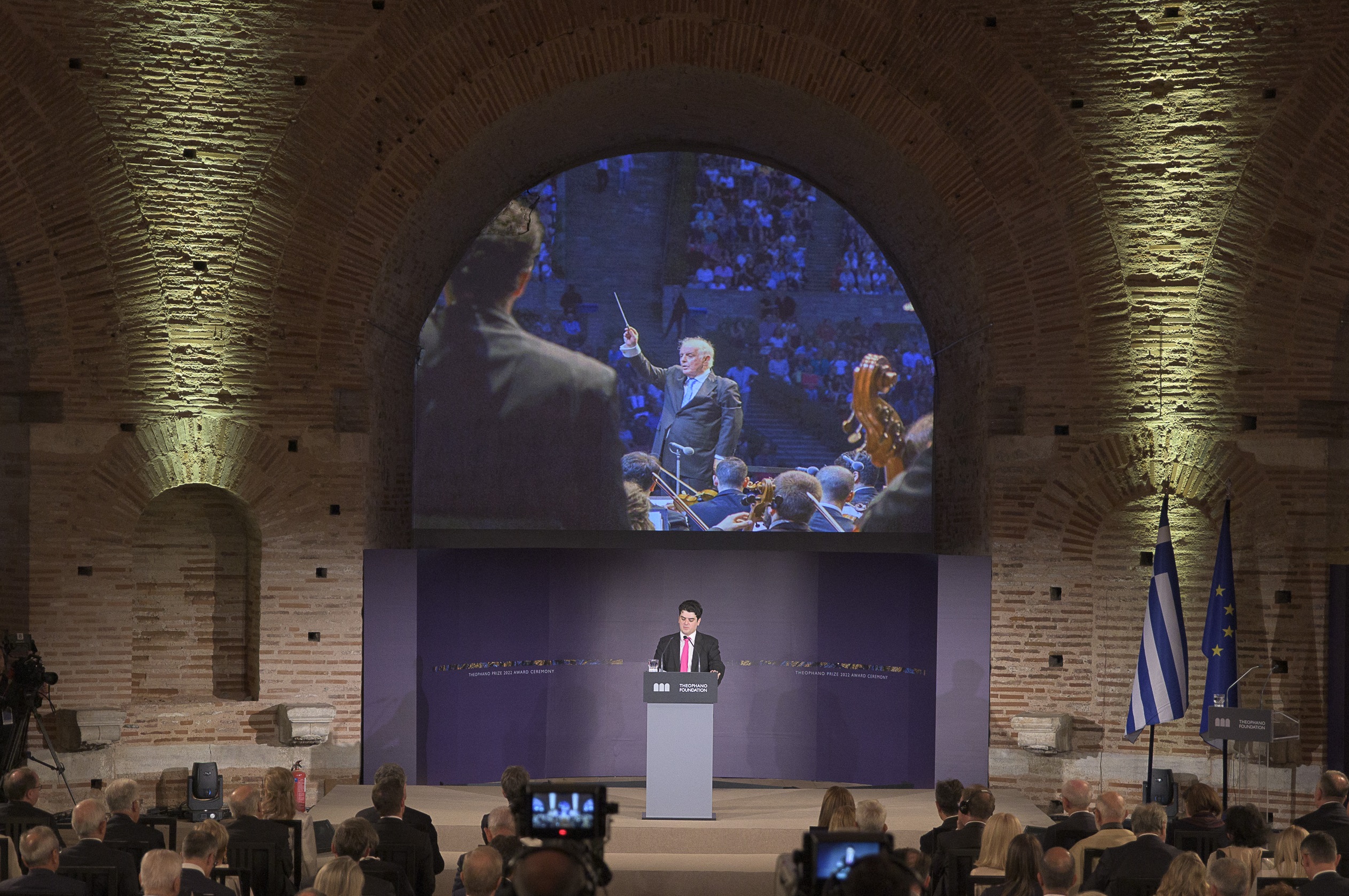
(…) The Empress Theophano Prize was created in memory of a remarkable Greek woman who went on to become the Empress of the Holy German Empire; and it is presented in Thessaloniki, a city with such historic and cultural symbolism, which stands at the crossroads of East and West. To my father, both of these aspects seem to be very close to everything the West-Eastern Divan Orchestra stands for: to initiate a dialogue between cultures and between human beings. What’s more, my colleagues, my father, and I feel particularly humbled to be the third recipients of this prize, following President of the European Commission Ursula von der Leyen, who was recognized for her role as part of the European peace project that is the ERASMUS student program, and Dr. Özlem Türeci and Dr. Uğur Şahin, who showed us a way out of the global pandemic by developing the first Covid vaccine.
This year’s prize recognizes the role of art in intercultural dialogue. My father has been passionate about this idea for many decades (…)
One of the aspects that make the West-Eastern Divan Orchestra possible is the fact that music doesn’t contain limited associations as words do. It teaches us that there is nothing that doesn’t include its parallel or opposite—like the work you’ll hear today, the Octet by Felix Mendelssohn, which combines intimacy and openness, chamber music and symphony, introversion and extroversion. It brings the grand gesture to the small room, as well as the delicate nuance to the big stage. I am pleased and proud to be joined today by my colleagues of the West-Eastern Divan Ensemble, a group which enables us to represent the message of the orchestra in a more intimate setting.
By itself, music may not be able to solve any problems, but it can teach us to think in a way that is a school for life.
